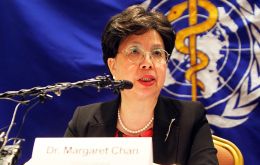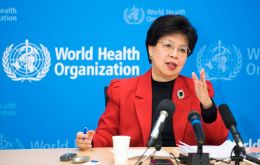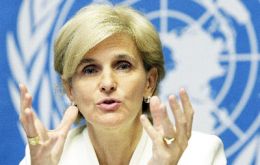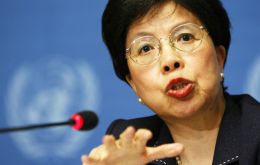MercoPress. South Atlantic News Agency
Tag: World Health Organization (WHO)
-
Friday, October 30th 2015 - 08:03 UTC
WHO clarification: moderate consumption of meat, particularly preserved meat

The World Health Organization, WHO, has received a number of queries, expressions of concern and requests for clarification following the publication of a report from the International Agency for Research on Cancer (IARC) relating to processed meat and colorectal cancer.
-
Thursday, October 29th 2015 - 14:50 UTC
Tuberculosis mortality nearly halved since 1990

The fight against tuberculosis is paying off, with this year’s death rate nearly half of what it was in 1990. Nevertheless, 1.5 million people died from TB in 2014. Most of these deaths could have been prevented, according to the World Health Organization’s Global Tuberculosis Report 2015, which was released on Wednesday in Washington, DC.
-
Tuesday, October 27th 2015 - 09:39 UTC
Processed meats can cause colorectal cancer in humans, says WHO

Eating processed meats like hot dogs, sausages and bacon can cause colorectal cancer in humans, and red meat is also a likely cause of the disease, World Health Organization (WHO) experts said.
-
Sunday, October 25th 2015 - 10:16 UTC
Monsanto in the dock? possible mass tort civil action against glyphosate

Personal injury law firms around the United States are lining up plaintiffs for what they say could be “mass tort” civil actions against agrochemical giant Monsanto that claim the company’s Roundup herbicide has caused cancer in farm workers and others exposed to the chemical.
-
Friday, July 24th 2015 - 00:23 UTC
World Health Organization calls for urgent action to curb hepatitis

On World Hepatitis Day (28 July) the World Health Organization highlights the urgent need for countries to enhance action to prevent viral hepatitis infection and to ensure that people who have been infected are diagnosed and offered treatment. This year, the Organization is focusing particularly on hepatitis B and C, which together cause approximately 80% of all liver cancer deaths and kill close to 1.4 million people every year.
-
Thursday, July 16th 2015 - 08:15 UTC
Aphids beat latest 'odor' efforts to repel them and protect GM crops

In what is described as a major blow to genetic modification of crops, a variety of wheat developed in the UK to repel pests has failed in field trials. The variety engineered to produce an odor that repels aphids, failed in the field test after it was successfully tested in the lab, proving a wide gap between lab and commercial application of the process.
-
Wednesday, July 8th 2015 - 01:05 UTC
WHO: Stepped up government tax action needed to curb tobacco epidemic

Too few governments levy appropriate levels of tax on cigarettes and other tobacco products. They therefore miss out on a proven, low-cost measure to curb demand for tobacco, save lives and generate funds for stronger health services, according to the World Health Organization’s Report on the Global Tobacco Epidemic-2015.
-
Wednesday, July 1st 2015 - 20:27 UTC
Lack of sanitation for 2.4 billion people undermining health improvements

Lack of progress on sanitation threatens to undermine the child survival and health benefits from gains in access to safe drinking water, warn WHO and UNICEF in a report tracking access to drinking water and sanitation against the Millennium Development Goals.
-
Friday, May 29th 2015 - 09:22 UTC
WHO calls for action against illicit tobacco trade on World No Tobacco Day

Eliminating the illicit trade in tobacco would generate an annual tax windfall of 31 billion dollars for governments, improve public health, help cut crime and curb an important revenue source for the tobacco industry. Those are the key themes of World No Tobacco Day on May 31 when the World Health Organization will urge Member States to sign the Protocol to Eliminate the Illicit Trade in Tobacco Products.
-
Saturday, May 2nd 2015 - 10:46 UTC
“World closer than ever to wipe out polio, but no victory declaration yet”

The world is closer than ever to being able to wipe out polio, international experts said, with zero cases of the crippling disease recorded across all of Africa this year and fewer than 25 globally.
